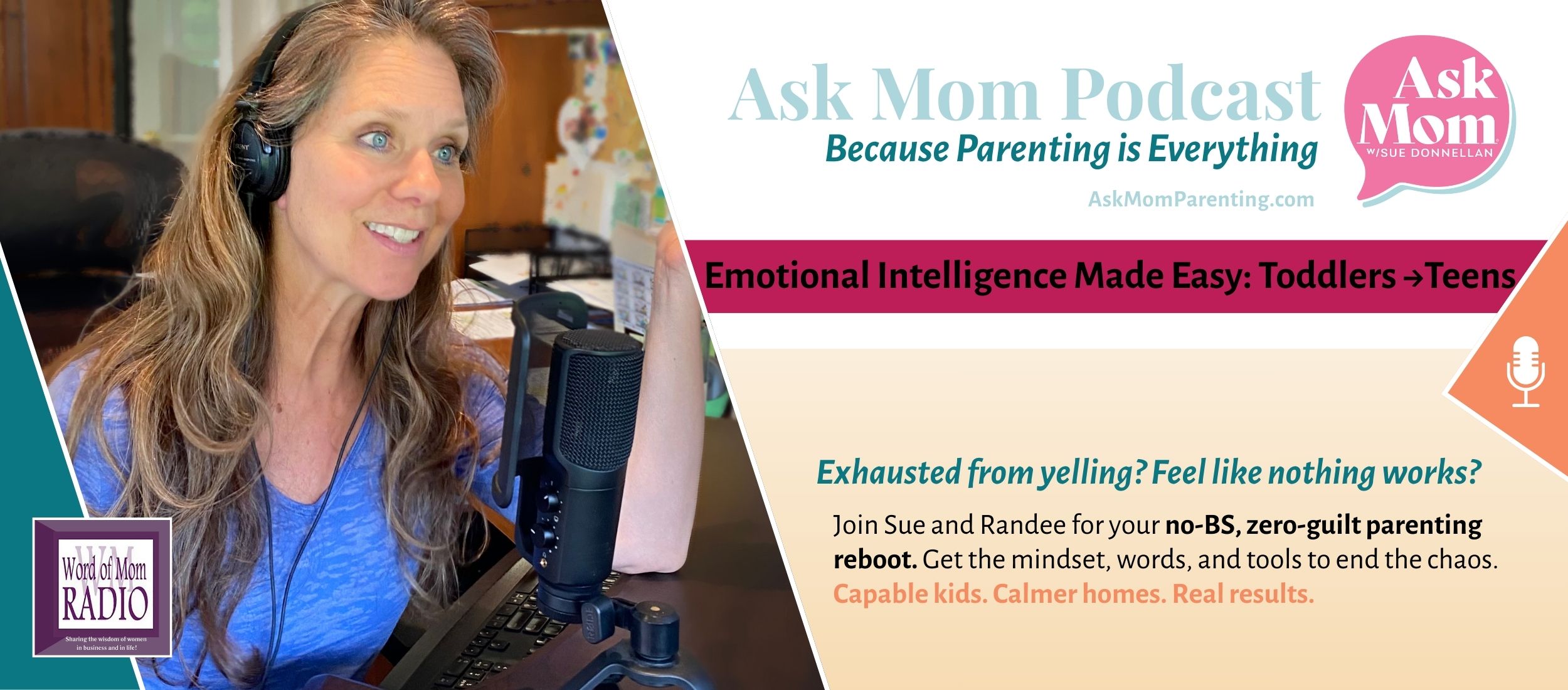Harnessing Intuition: How to Teach Kids to Trust Their Gut

Welcome to today's blog post, where we'll delve into the fascinating world of intuition and its crucial role in emotional intelligence and decision-making for children. In this post, we'll explore practical tips for parents to help their kids develop and trust their instincts, all while distinguishing between genuine gut feelings and mere guesswork. This topic aligns perfectly with our latest podcast episode, Emotional Intelligence Made Easy on Ask Mom with Sue Donnellan. In that episode, Sue discussed how to empower kids to read the room, trust their instincts, and make better choices without constant intervention. We'll be expanding on those concepts here, giving you actionable strategies to implement in your own family. Get ready to unlock the power of intuition in your child's life!
The Power of Intuition in Parenting
Intuition, often described as a "gut feeling," is a powerful cognitive process that allows us to understand something instinctively, without conscious reasoning. It's a form of rapid pattern recognition, drawing on our past experiences and knowledge to provide insights. In parenting, intuition can be an invaluable tool. It can guide us in understanding our children's unspoken needs, detecting subtle changes in their behavior, and making decisions that are in their best interests, even when the rationale isn't immediately clear. It's that "knowing" that something is right or wrong, safe or unsafe, even before we can articulate why.
Relying solely on logic and reasoning in parenting can be limiting. Children, especially young ones, don't always have the vocabulary or cognitive ability to express their feelings and experiences clearly. This is where parental intuition steps in. By tuning into nonverbal cues, body language, and subtle emotional shifts, parents can gain a deeper understanding of what their child is going through. This intuitive connection fosters a stronger parent-child bond, built on empathy and understanding. It allows us to respond to our children's needs more effectively, providing the support and guidance they truly need.
Why Emotional Intelligence and Intuition Matter for Kids
Emotional intelligence (EQ) is the ability to understand, use, and manage our own emotions in positive ways to relieve stress, communicate effectively, empathize with others, overcome challenges and defuse conflict. Intuition is intrinsically linked to emotional intelligence. It's the inner compass that guides us through complex social and emotional landscapes. For children, developing both EQ and intuition is essential for their overall well-being and future success.
Children with high EQ are better equipped to navigate social situations, build healthy relationships, and manage their emotions effectively. They are more resilient in the face of challenges, more empathetic towards others, and more likely to succeed in school and life. Intuition complements EQ by providing an additional layer of insight. It allows children to sense underlying emotions, detect dishonesty, and make decisions that align with their values. Together, EQ and intuition empower children to become confident, compassionate, and well-adjusted individuals. Imagine a child who can not only understand their own sadness but also intuitively sense when a friend is feeling down and offer comfort.
Teaching Kids to Trust Their Instincts (and Modeling It)
One of the most impactful ways to teach children to trust their instincts is by modeling it ourselves. When we demonstrate that we value and act on our own intuition, we send a powerful message to our children that their inner voice is worth listening to. Start by verbalizing your own thought processes when making decisions. Explain how you considered the facts but also factored in your gut feeling. For example, "I was offered a new job, and while it seemed great on paper, I had a nagging feeling that it wasn't the right fit for me. So, I decided to trust my instincts and decline the offer."
Encourage children to share their own intuitive feelings and experiences. When they tell you about a situation where they felt uneasy or uncertain, validate their feelings and help them explore what might have triggered those feelings. Ask open-ended questions like, "What did you notice in that situation that made you feel that way?" or "What was your gut telling you at that moment?"
It's also important to teach children the difference between genuine intuition and fear-based reactions. Intuition is often a calm, clear knowing, while fear can be accompanied by anxiety and heightened emotions. Help children differentiate between these two by practicing mindfulness and encouraging them to pause and reflect before reacting. Another useful practice is to consider the source of the feeling: is it rooted in past experiences or preconceived notions, or is it a fresh, instinctive response to the present situation?
From 'Fit In' to 'Feel In': Upgrading Confidence and Mental Health
Many children feel pressure to "fit in" with their peers, often at the expense of their own values and authenticity. This can lead to feelings of anxiety, insecurity, and low self-esteem. Shifting the focus from "fitting in" to "feeling in" is a powerful way to upgrade their confidence and mental health. "Feeling in" means being comfortable and accepted for who you truly are, rather than trying to conform to external expectations.
Encourage children to embrace their unique qualities and interests. Celebrate their individuality and help them understand that it's okay to be different. Support their passions and provide opportunities for them to connect with others who share similar interests. Help them identify their core values and encourage them to make choices that align with those values. When children feel comfortable in their own skin and are living authentically, they are more likely to experience genuine connection and belonging. This fosters a sense of self-worth and resilience that protects them from the negative impacts of peer pressure.
The 360 & Release Method for Tough Decisions
When faced with a tough decision, the 360 & Release Method can help children gain clarity and make choices that align with their values and intuition. This method involves examining the decision from all angles (the 360) and then releasing any attachment to a particular outcome.
Here's how the method works:
- Identify the decision: Clearly define the decision that needs to be made.
- Gather information: Collect all relevant facts and information about the decision.
- Explore perspectives: Consider the decision from multiple angles, including the perspectives of others who may be affected.
- Listen to your intuition: Pay attention to your gut feelings and emotions related to the decision.
- Identify your values: Determine which values are most important in this situation.
- Make a choice: Based on all of the above, make a decision that aligns with your values and intuition.
- Release the outcome: Accept that you cannot control the outcome of the decision and release any attachment to a specific result.
The 360 & Release Method empowers children to make informed decisions while trusting their inner guidance. It helps them move beyond anxiety and control to embrace a more confident and grounded approach to decision-making.
Real-Life Examples: Spotting the Unspoken
Intuition often manifests as the ability to "read between the lines" and spot the unspoken in social interactions. Teaching children to recognize subtle cues and nonverbal communication can enhance their intuitive abilities.
Here are some real-life examples:
- Teacher: A teacher says, "I'm fine," but her voice sounds strained and her body language is tense. An intuitive child might sense that the teacher is actually feeling stressed or overwhelmed and offer help.
- Classmate: A classmate agrees to participate in a group project, but his body language suggests reluctance. An intuitive child might pick up on this and offer the classmate an opportunity to express his concerns.
- Waitress: A waitress is overly friendly and attentive, but her eyes seem distant and disconnected. An intuitive child might sense that the waitress is going through a difficult time and offer a kind word or gesture.
By discussing these examples with children, you can help them develop their ability to recognize subtle cues and respond with empathy and understanding. Encourage them to ask questions like, "What do you notice about their body language?" or "Does their words match their actions?"
The Neuroscience Link: Parental Emotion-Coaching
Research in neuroscience has shown a clear link between parental emotion-coaching and children's emotional intelligence, focus, empathy, and stress recovery. When parents consistently validate and empathize with their children's emotions, they help them develop stronger neural pathways related to emotional regulation and social understanding.
Parental emotion-coaching involves:
- Recognizing and labeling children's emotions.
- Validating their feelings, even when you don't agree with their behavior.
- Helping them understand the source of their emotions.
- Guiding them in developing healthy coping strategies.
Emotion-coaching not only enhances children's emotional intelligence but also strengthens their intuitive abilities. By creating a safe and supportive environment for emotional expression, parents empower children to trust their inner feelings and make decisions that align with their authentic selves. This approach fosters resilience, empathy, and a deeper sense of self-awareness, all of which contribute to a stronger and more reliable intuition.
Practical Tips and Scripts for Parents
Here are some practical tips and scripts that parents can use to help their children develop and trust their intuition:
- Validate their feelings: "I see that you're feeling sad/angry/frustrated, and that's okay."
- Ask open-ended questions: "What do you think your gut is telling you in this situation?"
- Encourage self-reflection: "Take a moment to pause and notice how your body feels when you think about this decision."
- Model intuitive decision-making: "I'm feeling a bit uneasy about this, so I'm going to trust my instincts and say no."
- Teach them to differentiate between intuition and fear: "Is this feeling coming from a place of calm knowing, or is it driven by anxiety?"
- Help them identify their values: "What's most important to you in this situation?"
- Use the SEE → FEEL → USE framework: "Let's see what's happening, feel our emotions, and then use our feelings to make a good choice."
Remember to be patient and supportive as your children develop their intuitive abilities. It's a lifelong journey of self-discovery and growth.
Raising Children Who Trust Themselves
Raising children who trust themselves requires a conscious effort to cultivate their emotional intelligence, nurture their intuition, and empower them to make authentic choices. By providing a safe and supportive environment, modeling healthy decision-making, and offering practical tools and strategies, parents can help their children develop a strong sense of self-worth and resilience. Ultimately, children who trust themselves are better equipped to navigate the complexities of life, build healthy relationships, and pursue their dreams with confidence and purpose. They become individuals who are not swayed by external pressures but are guided by their own inner compass, making choices that align with their values and contribute to their overall well-being.
Empowering our children to trust their intuition is a gift that lasts a lifetime. It's an investment in their emotional well-being, their decision-making skills, and their overall success in life. Remember to listen to the episode Emotional Intelligence Made Easy on Ask Mom with Sue Donnellan for even more insights and practical tips. The show notes provide valuable links and resources to further support your journey. Together, let's raise a generation of confident, compassionate, and intuitive individuals!




